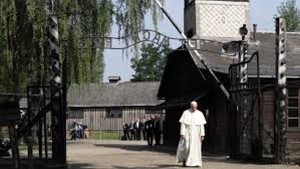“Now that the pope has sounded the alarm, we can look forward to a much more robust policy of inaction.”
 Palmyra, July 31 – Christian communities facing genocide at the hands of the Islamic State and other forms of persecution under Arab-Muslim regimes in the Levant have already noticed that in the wake of Pope Francis’s historic visit to the Auschwitz death camp in Poland, nothing has changed in the world’s reaction to the way they are being treated.
Palmyra, July 31 – Christian communities facing genocide at the hands of the Islamic State and other forms of persecution under Arab-Muslim regimes in the Levant have already noticed that in the wake of Pope Francis’s historic visit to the Auschwitz death camp in Poland, nothing has changed in the world’s reaction to the way they are being treated.
The pope walked silently through the iconic “Arbeit Macht Frei” gate at the entrance to the Auschwitz complex late last week, after which he pleaded to governments to act to help Christians who numbers have been shrinking in countries they have inhabited for nearly two thousand years and where Islamic militants have been systematically killing them or driving them out. Immediately following Francis’s remarks, the Armenian, Coptic, Eastern Orthodox, and other Christian groups in the Middle East and North Africa felt no sudden change in their circumstances, or in the attitudes of the nations or organizations in a position to help them.
Copts in Egypt, who face deadly violence almost daily, told reporters that now that the pope has issued his emotional appeal, they expect the world to pay the same lack of attention to their plight. “We’re looking forward to a shift into more of the same,” said Gabriel Jafri, whose family was beaten by a Muslim mob last week amid rumors that the community intended to build a new church. “Pope Francis sounded a call for the Western powers and international organizations to step in and put a stop to the crimes taking place all the time against our persecuted communities across the region. He even compared our treatment to the extermination of Jews at Auschwitz-Birkenau, which means the Catholic Church views this situation as a moral issue of the highest urgency and intensity. As such, we anticipate no change at all in our circumstances, given the way things have gone until now.”
Aramean Christians who survived Islamic State control of Palmyra in Syria took the same encouragement from the precedent of Western action to prevent the 1994 genocide of Tutsis in Rwanda. “Now that the pope has sounded the alarm, we can look forward to a much more robust policy of inaction,” predicted Fared Jibril, most of whose family survived by pretending to be Muslim. “When the Rwanda genocide happened, we saw exactly the same international mobilization to put a stop to it as we’re seeing over our suffering and deaths. the West is nothing if not consistent.”




